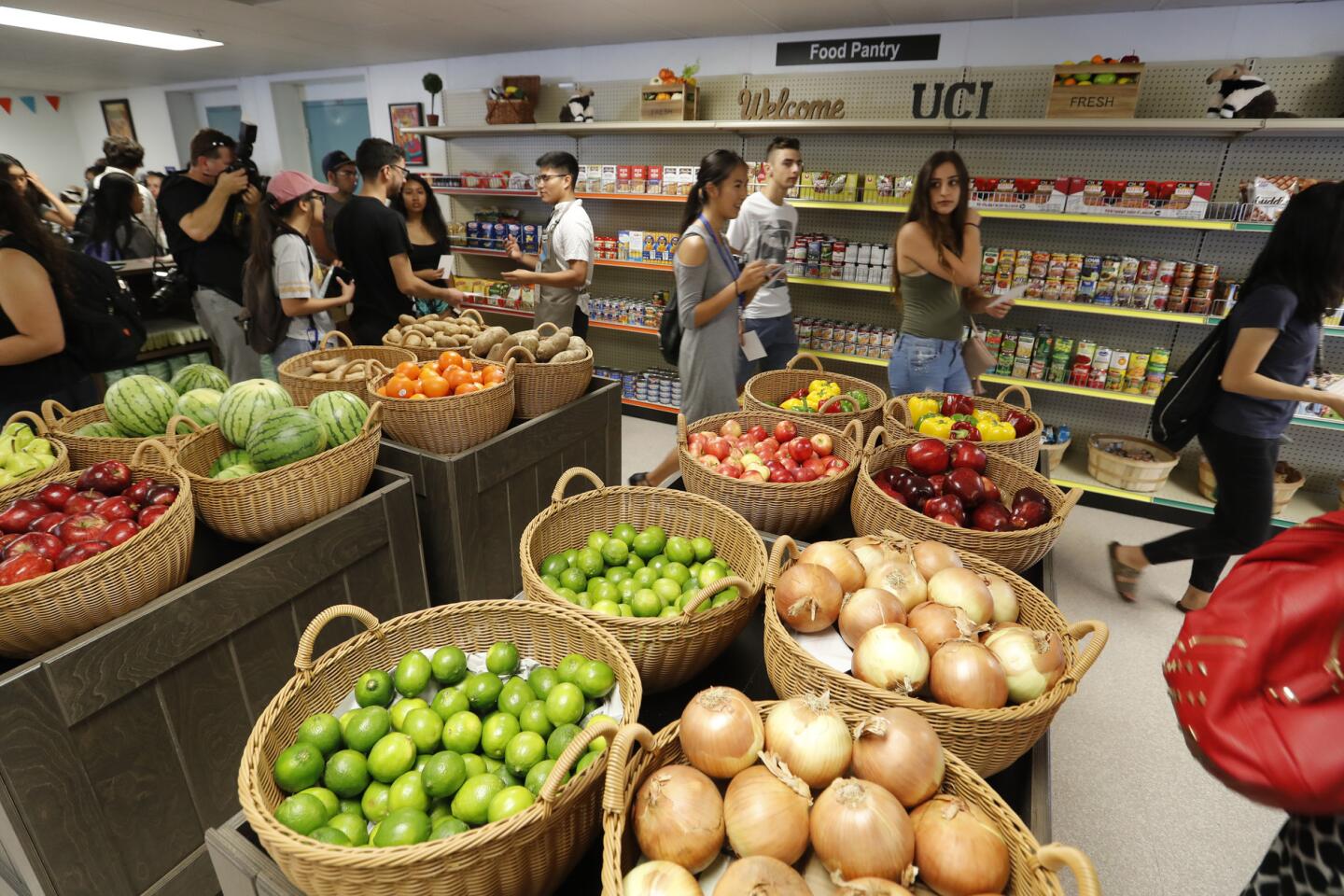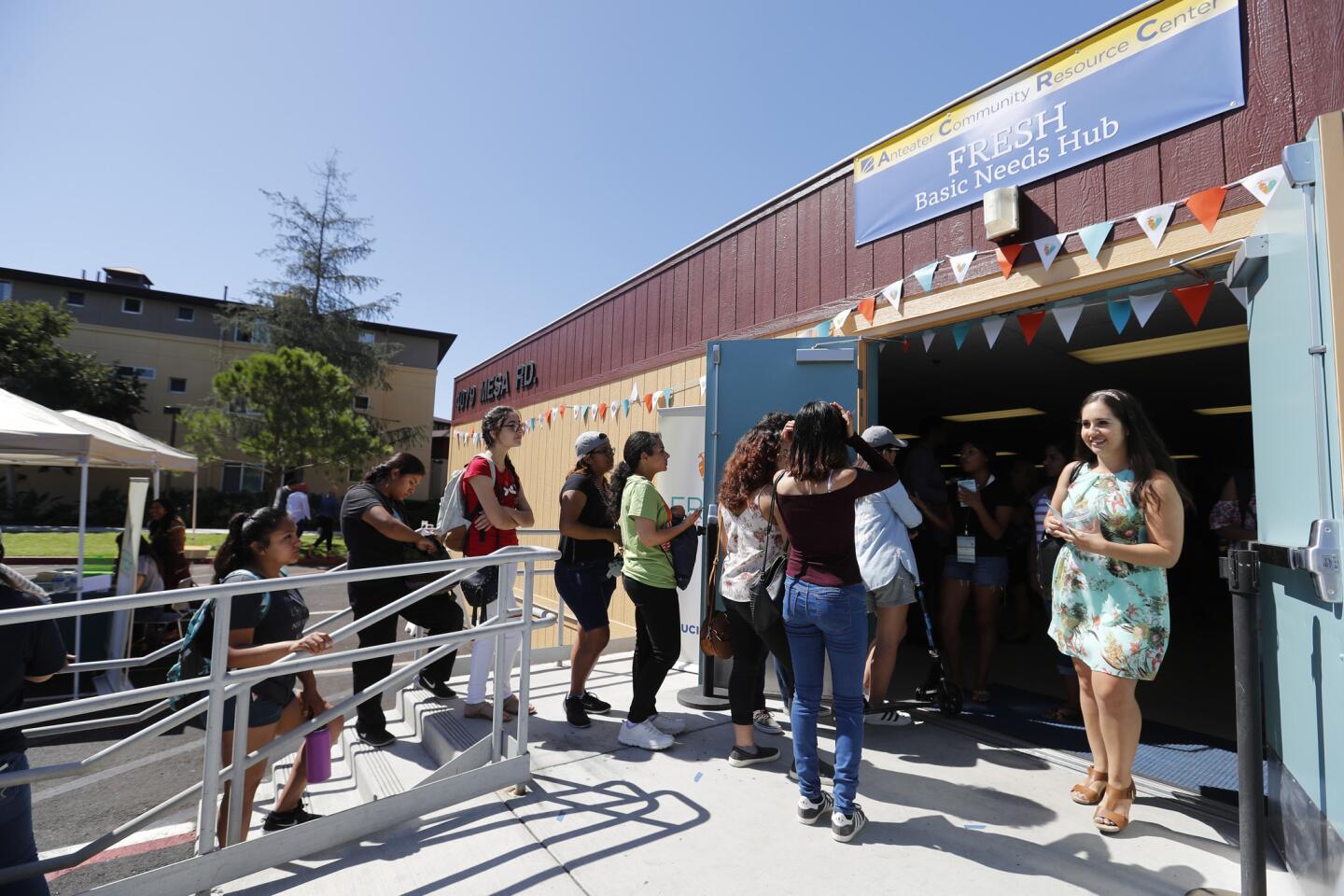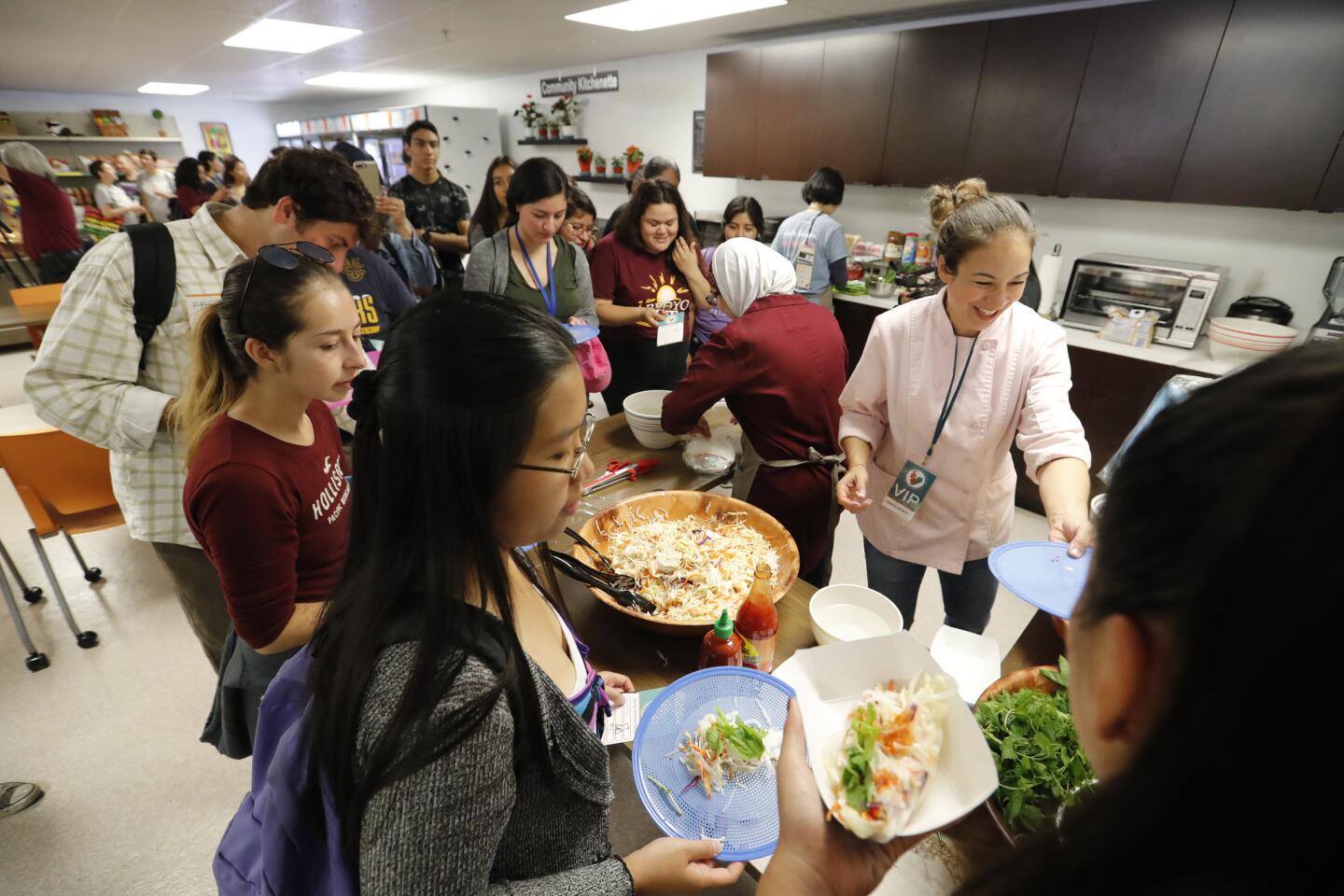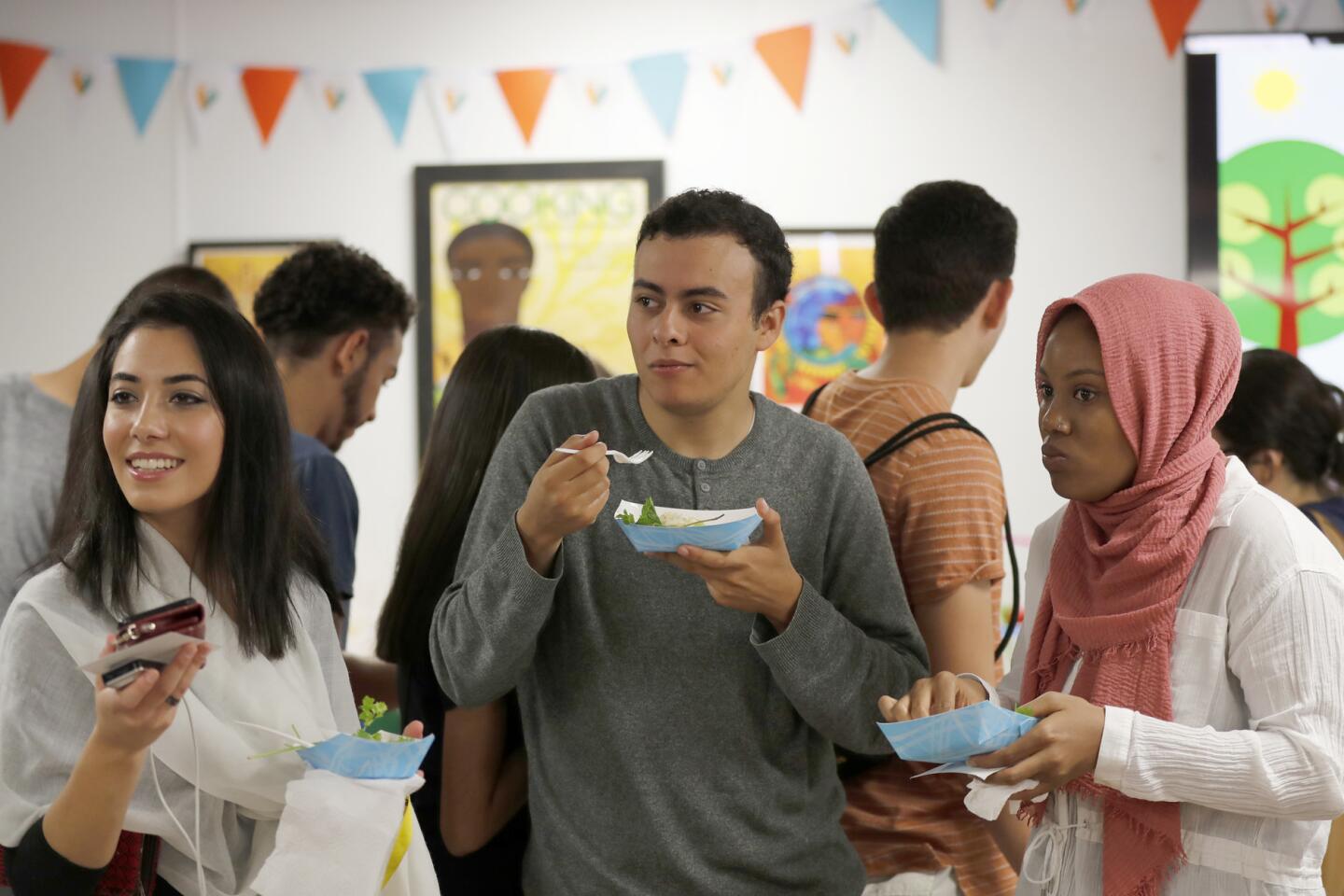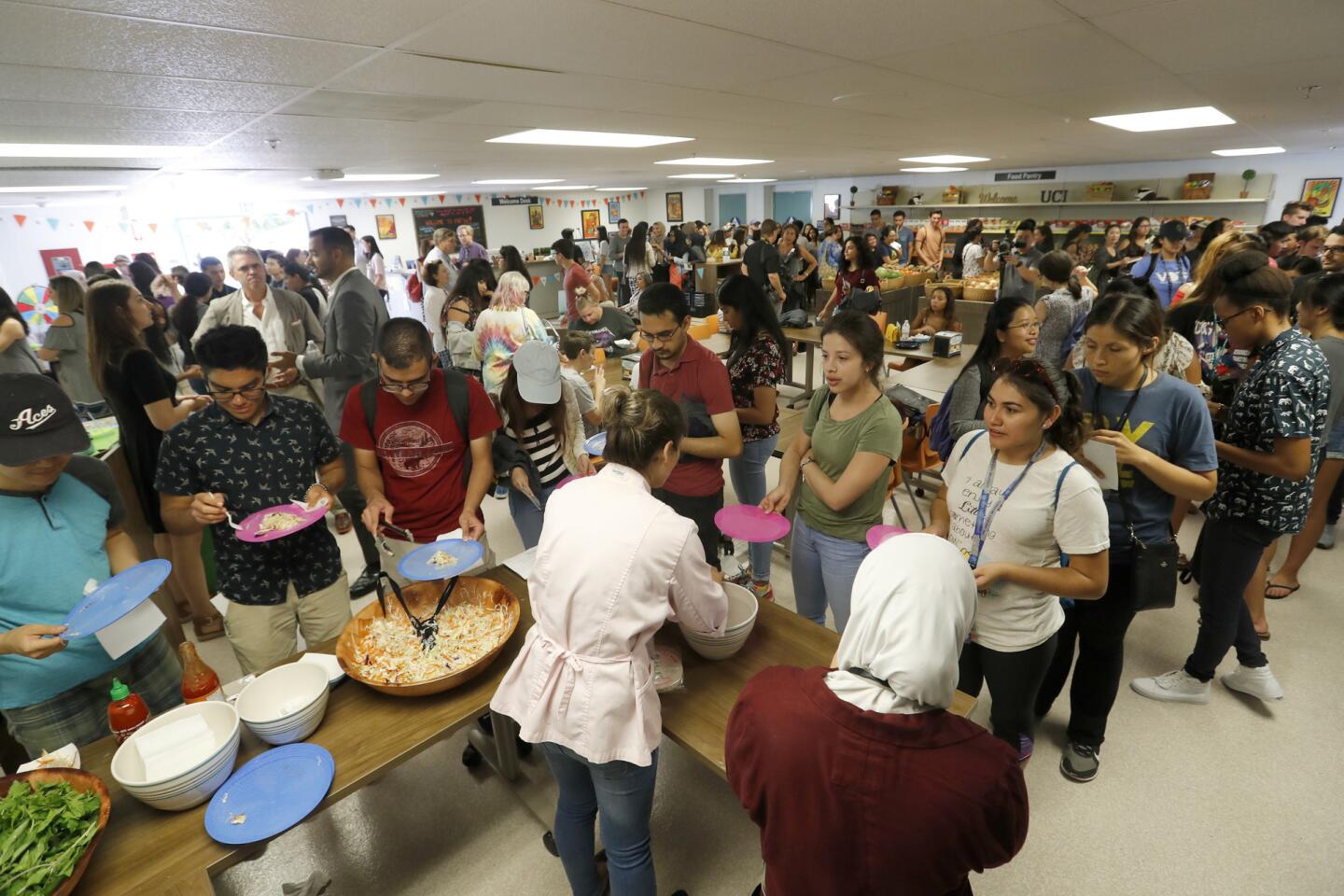UC Irvine opens expansive food pantry as more college students struggle with hunger

UC Irvine opens an expansive food pantry as more college students struggle with hunger and food insecurity.
UC Irvine student Ernest Devin Rankin grew up in Anaheim on one meal a day as his disabled parents, who had six children, struggled to stretch food stamps and disability payments.
When he got to college, he could only afford the cheapest dining plan, offering 100 meals a quarter. When those meals ran out, he asked friends for help or survived on $1 fast-food burgers, tacos and burritos.
Rankin and thousands of other UC Irvine students facing similar struggles got some major help Wednesday when the university opened the largest food pantry in the 10-campus University of California system. The 1,800-square-foot FRESH Basic Needs Hub houses shelves of canned and dried foods, coolers for refrigerated and frozen items, toiletries and a kitchenette complete with blenders, a convection oven, a microwave and a coffee machine. It’s a spacious place, with areas where students can sit and talk. If they want, they can read cookbooks or take home any of 15 varieties of seeds — pumpkin, spinach and parsley among them — to try to grow their own produce.
“It means the world to me knowing there are people who will fight for students like me,” said Rankin, 18, who is a sophomore majoring in public health policy and educational science.
The expansive food pantry is part of the UC Global Food Initiative, a three-year push to tackle the problem of food insecurity, both at home and abroad. A systemwide survey last year found that 4 in 10 students did not have a consistent source of high-quality, nutritious food. The survey of 9,000 students, believed to be the nation’s largest look at campus food security, found that nearly one-third of those in need had difficulty studying because of hunger and that about one-fourth had to choose between paying for food or for educational expenses and housing.
In releasing the results last year, UC President Janet Napolitano also announced a $3.3-million effort to expand the fight against campus malnutrition. She gave each campus $151,000 on top of $75,000 she’d allocated in 2015, to work on tackling the problem.
Across the system, campuses have opened food pantries, arranged emergency funding, started organic gardens and participated in “Swipe Out Hunger” programs that allow students to donate extra money on their meal plans to students in need.
At UC Irvine, students approved a fee of $3 per quarter last year to help needy students obtain nutritious food. UC Irvine officials are using Napolitano’s funds and the $150,000 in annual revenue from the fee to create and equip the new pantry, hire staff and provide classes on nutrition, cooking and financial planning. They are working with the Orange County and Second Harvest food banks.
UC Irvine first opened a food pantry offering nonperishable items in 2015. It drew nearly 10,000 visits last year. The campus also hosts monthly “free farmers markets” with fresh produce and runs educational workshops.
“At UCI, we are trying to set the standard for what campuses and communities around the nation should do,” said Thomas A. Parham, vice chancellor of student affairs, at Wednesday’s ribbon cutting for the new space.
When students went inside, they gaped at the array of food: rice, beans, chicken, tuna, vegetables, peanut butter, soups, packages of vegetable tikka masala, dried Korean noodles and tortilla chips.
Baskets filled with produce — watermelons, potatoes, apples and tomatoes — drew oohs and aahs.
“Oh, potatoes! I can make curly fries!” said Anamaria Cuevas, 18, a Chino Hills freshman. She shot video to send to her father — who has been worried about her meals.
Fridges were stocked with cheese, milk, yogurt, mushrooms, tofu, frozen pasta and vegetables. In the kitchenette area, culinary education director Jessica Van Roo demonstrated the art of making Vietnamese spring rolls stuffed with cabbage, carrots, basil and cilantro and seasoned with Sriracha sauce.
“If you don’t know how to make food, we can show you,” she told students as they lined up for samples. “You can get free food, but if you don’t know how to cook, it’s a struggle.”
The campus’ basic needs coordinator, Andrea Gutierrez, who will oversee the food pantry, said nearly 44% of UC Irvine students lack consistent access to nutritious food. Nearly 19% of those students are forced to skip meals and go hungry, while 25% eat regularly but get by on cheap but such non-nutritious food as instant ramen or fast food.
To people who dismiss the food problem and believe instant ramen is a college staple, Gutierrez said, “A student should not eat Top Ramen and be malnourished. We can no longer accept that as reality.”
Students will be allowed to take home two bags of groceries a week after they certify that they understand the food is meant for those who can’t afford meals.
Guillermo Paez, a fifth-year sociology major, said he and other students struggling to find food often hide their problem. When he was a freshman, he could not pay a $3,000 balance on his university bill and lost his meal plan. At first, he didn’t even tell his own mother, who works as a motel maid. He lived on such meager fare as carrots and peanut butter, and his grades plunged, he said, because he could not concentrate. Eventually, he let his mother know, and she scraped together the money to pay the bill.
The new pantry, he said, will be a godsend. “Students will know they are not alone.”
ALSO
California’s students stagnate on standardized tests — but the lowest scorers are improving
Occidental College announces new Obama Scholars program
Jeff Sessions wades into debates on campus free speech and NFL protests
More to Read
Sign up for Essential California
The most important California stories and recommendations in your inbox every morning.
You may occasionally receive promotional content from the Los Angeles Times.
